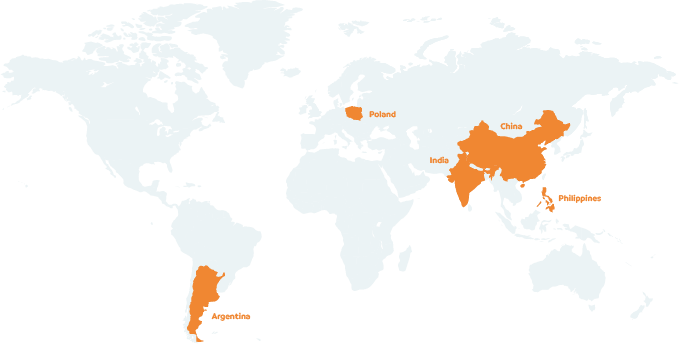Top five countries to outsource software development
Outsourcing software development is nothing new. For many years companies have looked beyond their own four walls for partners to help enhance their digital transformations, all the more so in a business environment that sees the International Data Corporation predicting that global spending on such technologies and services will reach an estimated $6.8 trillion between 2020 and 20231. Software development is big business and organizations of all sizes have long been attracted to the cost savings that come from partnering with offshore outsourcing providers.

And while the financial benefits of outsourcing IT remain, many companies are equally attracted these days to accessing the innovative technologies and top engineering talent that reside overseas. In their quest to provide better CX, deliver projects faster and increase business agility, executives know there are literally tens of thousands of highly qualified IT practitioners plying their trade in outsourcing hotspots who can not only ease their current software development workloads but, also help take their future digital transformation efforts to the next level.
What is outsourced software development?
Outsourcing software development involves delegating the building of a software product to another company. Rather than enduring the hassles of recruiting staff and managing such projects internally, many organizations relish the advantages that stem from partnering with an offshore provider or consultancy that is highly skilled and boasts extensive experience in the field.
The benefits of IT business process outsourcing include:
- Cost effectiveness – amid the many advantages of outsourcing, the ability to save money continues to be attractive for most companies. Some people would argue the business environment has never been more competitive and the chance to reduce expenditure on software development without forsaking access to quality technicians is a blessing many cannot ignore. The lower cost of living in certain countries means businesses can save up to 70% on labor and other associated expenses.
- Larger talent pools – ask any recruiter and they will tell you the impact of the global labor shortage is very real. Concepts such as ‘The Great Resignation’ and ‘Quiet Quitting’ are putting pressure on local job markets, hence why many companies are thrilled to partner with offshore providers that nurture and recruit from significant talent pools of IT specialists. Indeed, studies have shown that 46% of companies say outsourcing allows them to access skill sets2 that are not available in-house.
- Speed to market – they say time is money and that is certainly the case when it comes to delivering software development. The ability to develop and deploy tech innovations as quickly as possible is crucial, all the more so when competitors are aiming to do the same thing. By reducing the time needed to assemble teams and committing to ambitious project deadlines, offshore outsourcing providers can typically roll out both internal and public-facing innovations much faster than those that are managed by in-house operators.
- Scalability – with many digital transformation projects impacted by immediate needs or evolving budgets, outsourcing software development allows companies to scale staffing levels as required. Rather than deal with the logistical and financial headaches that come with permanent staff, business leaders can seamlessly grow or downsize their IT teams to meet their specific needs or project demands.
What makes a country suitable for outsourced software development?
As alluded to earlier, many companies will immediately turn their attention to the cost benefits of outsourcing to a certain country. The hourly rates or annual salaries of specialists is clearly one of the most important considerations when determining where to outsource software development to, but there are several other factors that act as a motivation.
- Talent pool – the larger the developer population a country boasts, the more chances there are of finding quality team members. Similarly, a lower developer population will likely mean higher wage costs due to the reality of supply and demand. For example, the Philippines sees more than 680,000 people graduate from university each year, with studies showing there are close to 75,000 workers in the IT segment of the nation’s outsourcing industry including many experts in software and website development. That is a whole lot of talent to recruit from.
- Social stability – it is a fact of life that some nations live under the shadow of political and social unrest, which is not conducive to a healthy outsourcing partnership. Such upheaval can have a devastating effect on an offshore provider’s ability to deliver a software development project, while also increasing the risk of hidden costs related to currency volatility, legal issues and productivity. An example was the Egyptian revolution of 2011 which is estimated to have cost the nation – and associated partners - up to $450 billion3. Remember, stability equals confidence.
- Language proficiency – don’t underestimate the importance of being able to communicate with ease when outsourcing software development. Given this article’s audience, that means partnering with providers that employ team leaders and developers that speak English well. Without a common language, there is a high chance of encountering problems related to negotiating deadlines and feedback, let alone when discussing the highly technical aspects of software development where every detail matters.
- Cultural alignment – amid concerns about money, social stability and language, it is easy to forget the benefits of choosing an outsourced partner that, to use a colloquial term, feels right. So much of that ‘vibe’ stems from the culture of the country in which they are based, with historical ties and social influences breaking down barriers that may exist in other countries. Take the Philippines, a former U.S. colony with a 90% Christian population that has a very ‘westernized’ culture and is renowned for a customer service culture based on loyalty, honesty and hard work.
What are the top five countries for outsourcing software development?

- China – when it comes to outsourcing powerhouses, China has claims for standing at the top of the pile. The U.S. outsources to China more than any other country4, with the nation’s outsourcing market growing by 30% each year. In terms of software development, it produces as many as 4.7 million tech graduates5 every year and has ranked first in a hypothetical analysis6 of countries to participate in a ‘programming Olympics’. It’s not all roses though, with only 10 million of China’s 1.3 billion residents speaking English7 and the country having a reputation for lax enforcement on Intellectual Property laws.
- India – with a technology workforce second in size to only China, India is a perennial contender on best countries for software development outsourcing lists. It is known for its low labor costs and backed by a government that offers education funding, land grants and tax concessions that appeal to western companies. While Indian developers choose popular languages such as Python for programming, it should be noted that studies have shown only 10% of IT engineering graduates have adequate coding skills8, which would be a concern for many outsourcing clients.
- The Philippines – there is a reason the Philippines is considered a prime outsourcing destination9 and the Tholons Globalization Index has ranked the capital Manila as the second best city for outsourcing in the world10. With a huge proportion of English speakers, a commercially attractive currency and significant government investment, the nation is home to a thriving outsourcing market. A specialized STEM high school system11 has further bolstered its strength in IT, with the Philippines IT Market report declaring software development has become one of the more established sub-sectors12 of the country’s information technologies industry.
- Poland – there is a lot to like about Polish software development outsourcing firms. Along with 30% of the population speaking English as a second language, the European nation is home to the third most skilled programmers in the world13 (according to statistics from HackerRank) and has claimed top spot in Java assessments and top-five placings in other mainstream programming languages such as Python, Shell and Ruby. The highly regarded Tholons Globalization Index14 also ranked Warsaw and Krakow in the world’s top 50 digital Super Cities, although the time zone is not ideal for North American companies wanting to conduct live meetings or in-person communication.
- Argentina – of the Central and South American nations that specialize in outsourcing software development, Argentina is well worth consideration. With more than 134,000 developers in the nation, there is no shortage of talent and a variety of government initiatives lend valuable support to the industry. Popular programming languages include JavaScript, HTML and Python, while seven Argentine universities have been ranked in the Best Global Universities15 and the country boasts the highest English Proficiency Index rating16 in Latin America.
Summary
Choosing to look offshore for one’s software development needs is just the first step on an outsourcing journey. Tapping into diverse talent pools, easing financial burdens and finding new sources of knowledge and skills may sound attractive but the key is to identify a country that best suits your specific needs. From the cost of labor and convenience of time zones to confirming expertise in the programming language you require, a little research can go a long way to ensuring success.
Whether the goal is to improve workflows, reduce human error or allow 24/7 capabilities, artificial intelligence was invented to make our lives more efficient. Explore the impact of AI on different business sectors, what the future of work looks like and how your business can embrace the technology to enhance operations.
Reference:
1 https://www.forbes.com/sites/forbestechcouncil/2021/10/05/the-pros-and-cons-of-software-development-outsourcing-during-a-digital-transformation/
2 https://fortunly.com/statistics/outsourcing-statistics/
3 https://egyptindependent.com/egypt-lost-us400-billion-during-the-2011-january-25-revolution-sisi/
4 https://www.zippia.com/advice/outsourcing-statistics/
5 https://www.forbes.com/sites/niallmccarthy/2017/02/02/the-countries-with-the-most-stem-graduates-infographic/?sh=43bdd7e3268a
6 https://www.hackerrank.com/blog/which-country-would-win-in-the-programming-olympics/
7 https://www.telegraph.co.uk/travel/maps-and-graphics/mapped-english-speaking-countries/
8 https://www.statista.com/chart/17565/coding-skills-and-employability-of-indian-it-engineering-graduates/
9 https://cdn.newswire.com/files/x/24/52/643156aaf14dcb4d5c8cb43d848f.pdf
10 https://resourcecenter.infinit-o.com/blog/manila-ranks-top-2-outsourcing-destination-in-the-world/#:~:text=Tholons%2C%20a%20US%2Dbased%20strategic,was%20last%20year%27s%20top%202.
11 https://en.wikipedia.org/wiki/Engineering_and_Science_Education_Program
12 https://www.researchandmarkets.com/reports/4850697/philippines-it-industry-by-hardware-market
13 https://www.hackerrank.com/blog/which-country-would-win-in-the-programming-olympics/
14 https://cdn.newswire.com/files/x/24/52/643156aaf14dcb4d5c8cb43d848f.pdf
15 https://www.usnews.com/education/best-global-universities/argentina
16 https://www.statista.com/statistics/1053066/english-proficiency-latin-america/
Popular posts
Browse by topic
- Accounting
- Accounting & Finance
- All Industries
- Banking
- BPO/RPO/HRO
- Communication
- CSR & ESG
- Customer & Client Acquisition
- Customer Experience
- Cybersecurity
- Cybersecurity & Compliance
- Data Management
- Digital Operations
- Digital Transformation
- eCommerce
- Education
- Employee Engagement
- Engineering & Construction
- Financial Services
- Healthcare
- Hospitality and tourism
- HR & Recruitment
- Information Technology
- Insurance
- Legal Services
- Logistics
- Offshoring & Outsourcing
- Outsourcing
- Professional Services
- Real Estate
- Retail & eCommerce
- Startups
- Talent Acquisition and Retention
- Technology
- Trends & Guides
- Workforce Integration
Sign up for the offshoring eCourse
12 in-depth and educational modules delivered via email – for free
Related Posts
Is offshore staffing the key to data compliance?
With entire websites dedicated to exposing businesses daily that have been hacked or have had their data breached daily, it’s no wonder why data..
The ultimate guide to outsourcing data processing services
For more than a century, Harvard Business Review has been a go-to resource for managers wanting insights into topics such as leadership, negotiation,..
How to outsource health information management (HIM)
What is outsourced health information management (HIM)?
